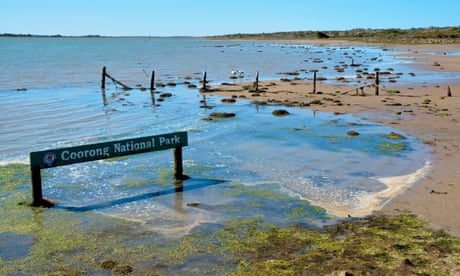- by foxnews
- 08 Apr 2025
‘Nothing off the table’ in bid to deliver 450GL of water for Murray-Darling, Labor says
‘Nothing off the table’ in bid to deliver 450GL of water for Murray-Darling, Labor says
- by theguardian
- 04 Aug 2022
- in news

Nothing is off the table in the battle to deliver 450 gigalitres of environmental flows for the Murray-Darling says the water minister, Tanya Plibersek, accusing the opposition of tying the Murray-Darling Basin Plan up in "brown tape".
While the federal government has consistently said that voluntary water buybacks could be a solution, Plibersek said on Wednesday that she had not given up hope on other projects to meet the 2024 deadline.
She was speaking during the ongoing fallout from a report this week that declared the water - earmarked to save critical wetlands, habitats, and fish and plant life - could not be delivered.
South Australia and environmentalists have battled to get the 450GL flowing, while irrigators in Victoria and NSW fought against it. Only 2.6GL has been delivered so far, eight years into the ten-year plan.
"It seems to be pretty rotten way to operate," Richard Beasley, senior counsel to the Murray-Darling Basin royal commission and author of Dead in the Water, said.
"It's an unfair way for cooperative federalism to work - that somewhere along the way the other states said 'fuck South Australia' and 'fuck the 450'."
The 450GL is embedded in the Water Act, and from there it is included in the basin plan, Beasley said. It was the critical factor in convincing SA to sign up to the plan.
"So it's all enshrined in the law," he said.
"It's for the Coorong, the Lower Lakes and the mouth of the Murray," he said. "And rivers die from the mouth.
"The Coorong may be in SA, which is not SA's fault, but it's the most important wetland in Australia. We will go into drought again and the Coorong is the last refuge for a lot of wildlife."
Not only is it the nation's most vital wetland, Beasley says, it's listed under the Ramsar convention (also known as the convention on wetlands), meaning Australia has international obligations to protect it.
Plibersek, who will meet with state and territory water ministers in the coming weeks, said she was already working towards meeting the target. Asked if water buybacks were the only way to get there, she said "nothing's off the table at this stage".
"We are very clear about what our objectives are, but we are open minded."
This week's water for the environment special account (WESA) report said the water would not be delivered "under the current settings". Plibersek said projects already underway would continue, but that the Liberal and National parties had stymied the process with "brown tape" that limited the projects that would be approved.
While the 450GL is enshrined in law, a separate deal struck later between state and federal water ministers added the proviso that it would only be delivered if there were no adverse socioeconomic consequences. That is often interpreted to mean a project to save water can't go ahead if it means a single job will be lost.
Buybacks were capped and effectively stopped under the Coalition government, which argued that they damaged communities.
Perin Davey, a Nationals senator and the opposition water spokesperson, said her position reflected the feelings of communities throughout the Basin.
"Voluntary buybacks reward an individual for their water, but the water is taken out of consumptive use," she said.
The opposition might be open to "strategic buybacks", she said, if someone who wanted to sell water was assessed and it was determined there would be no wider effects, but any decision would depend on the details of specific legislation.
Prof Quentin Grafton, from the Australian National University's Crawford School of Public Policy, said the deal that no projects would go ahead if there were any unintended consequences was "just an agreement".
"Think about all the jobs that were lost because we didn't have sufficient flows," he said.
"There have been thousands of jobs already lost."
Buybacks were the answer, Grafton said.
Grafton said "literally hundreds" of academic papers had documented the decline and degradation of the basin - from blue-green algae outbreaks, to mass fish kills, to towns running out of water - and that extraction had to be sustainable not just in times of floods, but in dry periods.
"The key object of the Water Act was to ensure environmentally sustainable levels of extraction. That's the law of the land," he said.
In the Senate on Wednesday, the Greens' water and environment spokeswoman, Sarah Hanson-Young, said the report showed the former government had "monumentally stuffed up the delivery of this water at the expense of taxpayers and the health of the river". She called on the Labor government to bring in voluntary buybacks.
South Australian Labor senator Penny Wong, on behalf of Plibersek, said it had become a "great deal harder" to deliver the 450GL and said when she was water minister (more than a decade ago), there were "willing sellers'".
- by foxnews
- descember 09, 2016
Ancient settlement reveals remains of 1,800-year-old dog, baffling experts: 'Preserved quite well'
Archaeologists have recently unearthed the remarkably well-preserved remains of a dog from ancient Rome, shedding light on the widespread practice of ritual sacrifice in antiquity.
read more


